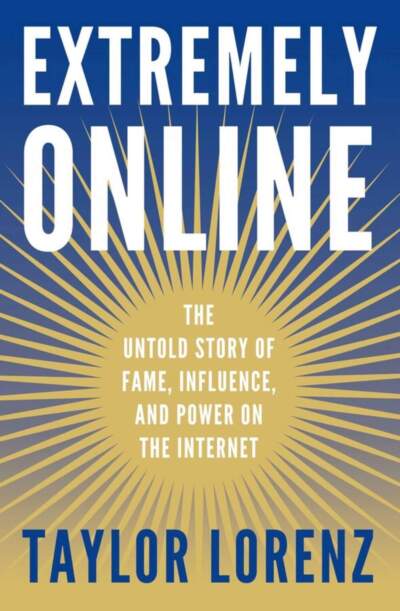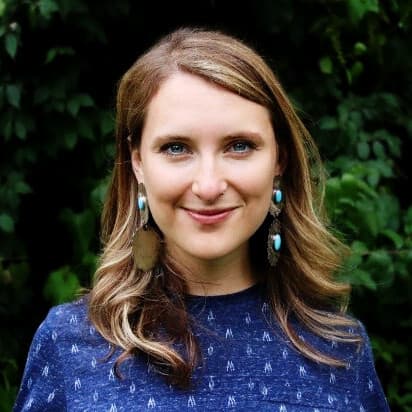Advertisement
The value of social media isn't the technology. It's us.
Resume
Washington Post tech columnist Taylor Lorenz talks to Endless Thread co-host Ben Brock Johnson about her new book, "Extremely Online: The Untold Story of Fame, Influence, and Power on the Internet." She argues that we've been paying too much attention to the Elon Musks of the world and not enough to everyday internet users.
Like the show? Help us out! Donate here.
Full Transcript:
This content was originally created for audio. The transcript has been edited from our original script for clarity. Heads up that some elements (i.e. music, sound effects, tone) are harder to translate to text.

Ben: Hello Endless Thread friends. Got something special for ya. Last week we told you about NPCs – people who are making bank on TikTok by acting like non–player characters on video games…which is to say doing the same things over. And over again. And that’s what Endless Thread is all about. Not doing the same thing over and over again, but looking at the experience of the internet. What people are making and how we’re all interacting with it. Because that’s what makes the internet interesting, right? It’s us, the users. Not the billionaires in Silicon Valley who get all the credit for building this technology…although lately, they’ve had some interesting drama, too, but that’s another episode. That idea – that the story of the world online is as significant, maybe more significant, when you tell it from the lens of the users and creators rather than the CEOs – is at the crux of a new book by Taylor Lorenz: Extremely Online: The Untold Story of Fame, Influence, and Power on the Internet.
Taylor is a tech columnist for The Washington Post, and after we talked to her about how NPC-Tok fits into the cultural fabric of the internet…we had a conversation about her book, and who holds the power when it comes to social media. So here’s a bonus conversation with Taylor Lorenz. Enjoy.
Ben: Taylor Lorenz, thank you so much for talking with us.
Taylor: Thank you so much for having me.
Ben: So, you're definitely not the first person to write a book about social media giants and how they came to be. But your book is different because you're calling this a social history of the internet. What were you hoping to capture?
Taylor: Well, I really wanted to tell this sort of other side of social media history because I think it's so underwritten and for the majority of the rise of social media, there weren't reporters covering it. It's kind of crazy to describe how small this beat remains. At least in 2020, there were more reporters covering Facebook alone as a company than all of internet culture.
Ben: Yeah. I feel like you've been fighting for the legitimacy of this story for a really long time.
Taylor: Yeah, I feel like it's like pushing the boulder up the hill over and over again and you know, it takes a while and you know, I think again, it's like there's just newspapers, traditional media have been notoriously blind to these shifts and refuse to adapt to them. So I really wanted to take a look back and be like, wait, let's look at some major moments and let's look at how this industry emerged truly. Because I think it's so different than this narrative that Silicon Valley continues to try to shove down people's throats. Most people think of the rise of social media as dominated by these like Silicon Valley men that really saw the future before anyone else and –
Ben: Total geniuses.
Taylor: Yeah, exactly. Brilliant. That's not true. Actually, as my book shows, many times they had absolutely no idea what they were doing or they were sort of resentful, of, you know, rolling out features that ended up saving them or they were sort of saved by specific communities that adopted their products. Social products aren't like other tech products in the sense that like the user base is the product. So the users have a massive amount of effect over the success of a product because the product at the end of the day is ultimately the social network that a platform itself cultivates.
Ben: If the platform is free, you are the product.
Taylor: Yeah. But also like, what is the value of Facebook or Instagram or Twitter? It's the people on it. I mean, there's a million Twitter clones as we've seen now, but because they haven't replicated that network of people on it...There's no value.
Ben: You're not going long on Threads? Is that what you're telling me?
Taylor: Oh my God. No, unfortunately not.
Ben: You talk about all of the power that these users, and especially super users, have... But have they frequently leveraged that power? Like, have they organized you know, like a union would organize in a meaningful way? Did you find examples of that?
Taylor: Yes, I would say users constantly exert their power I mean, look at things like the at sign or the hashtag or the retweet. These were user-driven behaviors that the product then integrated. I mean, as my book reports, YouTube itself started as a dating site, but it was the way that users used it uploading videos that the company actually leaned into and sort of adapted to and became this widely successful video sharing platform. In terms of labor, I mean, I think, people are starting to understand that content creation is labor, but there has not been a sort of a successful labor movement within the creator industry for so many reasons. It's like, it's kind of underappreciated, you know -
Ben: Is it too diffuse, kind of, in a way?
Taylor: Yeah, it's too diffuse, and it's not specialized in, in any real way, you know, you could eliminate all the content creators on earth today, and you would have a new crop of content creators tomorrow. That doesn't mean that they can't advocate for certain protections, but I think it's very hard.
Ben: I'm so glad that you tell the story of Vine in the book, you know, I was a tech reporter at the time and it made me so sad to see Vine just implode because. Vine is like essentially my favorite platform of recent memory. It's like, yeah, why is it yours? I mean, for me it was just so creative. And, and there were so many amazing things that were happening on it. Like in a way, the restrictions made it more creative. But what, why did you like it too?
Taylor: I loved it. I think the restrictions did make it more creative. I mean, it was the true first mainstream, mobile video app. There weren't these norms in place, there weren't, there weren't the NPC streamers and the, you know, like, the torture streams and all the weird stuff that happens now, like, none of it was, like, financialized, I guess, which ultimately ended up, leading to the app's downfall, but it was just sort of, pure creative expression and I think the six second restraint just allowed people to create just, funny, bite sized content in a way that just doesn't exist now.
Ben: Can you give me some favorites?
Taylor: Okay, my favorite Vine that I am not kidding I think about every single day is every single time I step into the shower I think of the vine that's shower time, Adderall, glass of whiskey, Diesel jeans.
[Sound from Vine]
Taylor: I think about it every day.
Ben: The one that I think about relatively frequently is the shopping cart full of ducks. Do you remember that?
Taylor: Oh my god, yes. Yes.
Ben: But there's another one that I remember of like, uh, It's like just a raccoon stealing dog food, I think. And it's like you've been hit by, you've been struck by a smooth criminal.
[Music from Vine]
Just like the combination of music and video. And I think interestingly, to me, TikTok seems like the most connected to Vine of any new platform. Do you feel like that?
Taylor: Yes, TikTok is very much the spiritual successor to Vine. And I actually talk about in my book, after Vine shut down, where the different talent from the platform went. First they went to Facebook Video actually, and then they were sort of wooed over to YouTube. But a lot of the young people that were Vine users and maybe not like, you know, the Logan Pauls, biggest content creators of the world, they went to Musical.ly and they adopted Musical.ly and started using Musical.ly for mobile video editing. A lot of those like, young teen, especially teen female audience.
Ben: In the book, you put social media into two camps, right? Entertainment model and Facebook model. Can you talk a little bit more about that and how those camps have evolved over time?
Taylor: Yes. So in the beginning, there was this sort of entertainment driven model of social media, which was like people using it for fame and attention and to build audiences. This was very much the MySpace model. So think of people like Tila Tequila, who was a big sort of content creator back then.
Ben: I forgot about Tila Tequila. Wow. Okay.
Taylor: She went off the rails, unfortunately, but -
Ben: Sad story in some ways. Yeah.
Taylor: But also bands, and sort of models got attention through MySpace. But it was really too early for that. I mean, I talk about in the book, this Facebook model of social media, which was all about kind of a walled garden and, Facebook capped your friends list at 5,000 people, cause they didn't want people using it for fame. It was more about manifesting your IRL connections on the internet through this highly curated experience. The Facebook model went out temporarily because there needed to be this bridge almost that got everybody online. But ultimately, the entertainment model of social media, I would argue, has won where we have these private spaces for group chats and, direct messaging and maybe Snapchat and things like that. And then you have the public facing side of things, which is, TikTok, basically. I mean, if you go back and read MySpace's marketing materials and compare it to how TikTok markets itself today, they're shockingly similar.
Ben: I wonder, you know, how you view the overall sort of evolution of these two models and how you would grade them. Like, how is each model doing?
Taylor: Well, I do think that, you know, both, have problems, the Facebook model really didn't allow for discovery. So it's like, once you add all the people you know, IRL, like, probably not going to add that many more people, you know? So I think that's why we see Facebook use kind of atrophying, especially in the U. S. Because people now accept the internet as kind of the default reality, and I think a lot of people want to discover interesting people online, and connect with people online, even if they're not someone that's in their sort of immediate area. The entertainment model of social media, I would say, struggles because I think without those tighter social bonds, it's hard to like keep people coming back. It can't just be like, a portable Netflix, you need to have some sort of parasocial relationship with the people that you are following and connecting with, which is why TikTok has sort of recently been pushing like friend connections, pushing you to add people in your contacts.They want you to have those deeper connections, because that does keep you coming back.
Ben: Speaking of coming back…we’ll have more with Taylor – including how mommy bloggers invented the influencer – after the break.
(Sponsor break)
Ben: As you lay it out in the book, where does the creator economy really start?
Taylor: It did not start with Mr. Beast.
Ben: Thank god.
Taylor: Um, it actually started a couple, yeah, honestly. It started a couple decades ago, and I talk about this in the book. It really started with the rise of mommy bloggers in the early aughts. And this was this generation of moms, primarily Gen-X moms, that really felt like women's media was not resonating with them, in the late 90s and early aughts. And so they started to set up blogs.
Ben: Six ways to make your husband happy wasn't working for them.
Taylor: Yeah, you know. I went back for this book and read a lot of women's media at the time, and it's actually crazy. It sounds like stuff that was from, I would imagine, the 1960s. And it's like, you know, 2002. It's like, a lot about, like, getting your pre-baby body back.
Ben: Oh my god.
Taylor: And pretty much nothing about, you know, the hard parts of pregnancy. And so, with these mothers, really did is break down barriers and start talking about, things like postpartum depression or struggling to breastfeed or not always loving your husband. So they were able to just generate massive amounts of engagement on the internet. And, they were the first to kind of build personal brands on the internet and then monetize those brands at scale.
Ben: How do you think we could build a more equitable and sort of powerful creator economy and tech industry? One that centers creators over platform builders?
Taylor: Yeah. Well, the first thing is, I think to sort of, take this content creator industry seriously and recognize it as labor and cover it as a labor story, which I think it hasn't been traditionally because this work is still so dismissed. People still think influencing is mostly just like women taking selfies online, it's this trivialization of women's work and of a very female dominated industry. I mean, women built the creator economy. They're never credited with it. They never get the respect they deserve. If you look at the most highly paged content creators, it's almost all men. And not only is it all men, it's mostly white men, it's almost no people of color, you know, LGBTQ people also are sort of, you know, they pioneered this industry and have largely been pushed out of certain areas of it,
Ben: Or kept out, yeah.
Taylor: Yeah, or they're demonetized, you know, they have their, their channels demonetized, it's harder for them to grow, it's, you know, these creators struggle a lot we need to take their work seriously in order to cover it critically and to push back on these platforms. And obviously the platforms need ten times more accountability, you know, for what they do. It's ridiculous, the amount of power that they have.
Ben: Are there platforms that you feel like, do you have, I don't know, flashes of the kind of world that you would like to see or that we should want to see when it comes to creators and creating online?
Taylor: Unfortunately, our social tech landscape right now is dominated by Facebook, really Meta, Google, and now, TikTok, and I think it's pretty notable that the only company that could even remotely compete with Meta and Google is this, multibillion dollar Chinese tech company ByteDance, which owns TikTok, like they could spend a billion dollars in 2019 alone for their app to break into the market. There's no way for these smaller apps that are more responsible to compete and to grow audiences at the scale that Meta and Google have, because they have such intense lobbying and you know, they squash the competition so effectively. So, I mean, I think something like Snapchat has always been really interesting and more responsive and really listened to users and actually ended up helping at least content creators monetize, but they were never able to scale because Facebook cut them off at the knees.
Ben: Well, it's interesting, too, like the examples that you give in some ways are not state-sponsored necessarily, but state-supported, both in the U. S. and, in China. I think it's arguable that, all of those big companies have in the past received a lot of support from the states that they were founded in, right, or exist in, or, you know
Taylor: Well, I mean, Musically was founded in America, but yes, absolutely. I mean, I think, look, Facebook and Google are so tightly tied in Congress. So many people in Congress quite literally have stock in, you know, they want these companies to succeed and they've refused oversight. I mean, it's very anti-competitive. And yeah, now of course, look at them freak out about TikTok. Not because of, there's any inherent problem with TikTok, really. I mean, they pretend that it's about the Chinese ownership. Really, it's about questioning Facebook and Google's supremacy in this country.
Ben: How do you think about some of the, some of the ways in which people have questioned how TikTok treats LGBTQ, creators, for instance?
Taylor: The same as YouTube. I mean, look at YouTube. Notoriously de platformed LGBTQ creators. You know, restricts their reach. you know, says that their content isn't like family friendly, community friendly enough. It's the same thing. I mean, the people that are dealing with these issues are dealing with them across platforms. It's not like TikTok is uniquely censoring LGBTQ people. I mean, same thing with Twitch and all these platforms. It's very hard for people because they get hate campaigns. Same thing for women. Same thing for people of color. All of these marginalized groups struggle on these social platforms because their content is deemed not brand safe. they get mass reported. Nobody cares about their struggles on YouTube or Instagram seemingly. They care about making TikTok the villain because it's easier to make TikTok the villain than deal with the systemic issues inherent in our landscape.
Ben: When we talk about content creation, there's this idea of democratized access to the internet and opening up ways to build a career. But there's also the idea of like self-obsession of what, you know, effect personal branding has had on Gen-Zers and younger. How do you think we as people are changing as a result of that?
Taylor: Yeah, I talk about this in the book, but I think that this whole social internet has pressured all of us to commodify ourselves and our lives in sort of increasingly invasive ways. And I think that that ultimately can be very negative because you start to view yourself as a brand, it's sort of like the natural end point of capitalism is just -
Ben: Mm. Late stage capitalism is, yeah.
Taylor: Yeah, it's just like commodifying every single aspect of your life and personality and it's, it's dark, but a lot of people sort of turn to the internet because there is no stability, we have absolutely no social safety net in this country, people don't trust our economic system, they know very well that, it doesn't pay to be loyal to any kind of company, they're gonna lay you off tomorrow, you know, the system, um, that we live under is ruthless. And so I think people think, well, if I have a lot of followers, I mean, I was talking to a lot of kids about why they want to become influencers. And, it's stability. It's not fame. It's stability. They feel like. Basically, if they have a level of fame because of the way America treats fame, that they'll somehow be okay in life, you know? If they get sick, or their family needs help, they'll have thousands of fans to back their GoFundMe, or help them out, or, you know, if something happens to them, like they get abused by the police, like, they will have an audience, and so they will inherently be treated differently. That's very dark, it's like people trying to build a life raft basically in this like late capitalist hellscape, you know, it's depressing and that doesn't mean that it's not also liberatory and in really amazing ways a lot of people have built these incredible independent media businesses that are wonderful and serve a real need, but mmm, a lot of it's really. I don't know. It's, it's, yeah.
Ben: It's hard to stick the landing on something that.
Taylor: It's mostly dark and dystopian, let's be real.
Ben: As you're talking about this part of it, I'm, I'm remembering this, this sort of joke that everybody was making of like corporations or people after the, um, the Supreme Court ruling, and now you're describing like the other side of the coin, right? Which is people are corporations.
Taylor: Exactly. It's really just, you know, all of America's becoming just three corporations in a trench coat, or all of the internet, I guess.
Ben: Perfect. Great job, everyone. We can all go home now. Perfect. Well done. Taylor Lorenz, thank you so much for talking with us and, good luck with the book launch.
Taylor: Thank you so much. Thank you so much for having me.
Ben: This bonus episode was produced by Grace Tatter and Dean Russell. We’ll be back on Friday! See you then.



